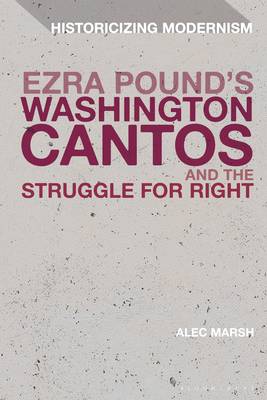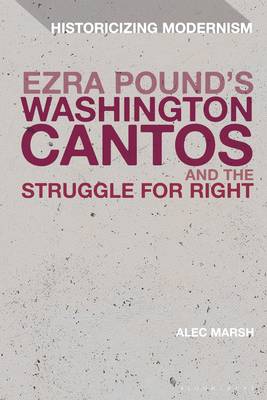
Bedankt voor het vertrouwen het afgelopen jaar! Om jou te bedanken bieden we GRATIS verzending (in België) aan op alles gedurende de hele maand januari.
- Afhalen na 1 uur in een winkel met voorraad
- In januari gratis thuislevering in België
- Ruim aanbod met 7 miljoen producten
Bedankt voor het vertrouwen het afgelopen jaar! Om jou te bedanken bieden we GRATIS verzending (in België) aan op alles gedurende de hele maand januari.
- Afhalen na 1 uur in een winkel met voorraad
- In januari gratis thuislevering in België
- Ruim aanbod met 7 miljoen producten
Zoeken
Omschrijving
The instalments of Ezra Pound's life-project, The Cantos, composed during his incarceration in Washington after the Second World War were to have served as a "Paradiso" for his epic. Beautiful and tormented, enigmatic and irascible by turns, they express the poet's struggle to reconcile his striving for justice with his extreme Right politics. In heavily coded language, Pound was writing activist political poetry. Through an in-depth reading of the "Washington Cantos" this book reveals the ways in which Pound integrated into his verse themes and ideas that remain central to American far-right ideology to this day: States' Rights, White-supremacy and racial segregation, the usurpation of the Constitution by the Supreme Court, and history as racial struggle.
Pound's struggle was also personal. These poems also celebrate his passion for his muse and lover, Sheri Martinelli, as he tries to teach her his politics and, in the final poems, mount his legal defence against the unresolved treason charges hanging over his head.
Reading the poetry alongside correspondence and unpublished archival writings, Ezra Pound's Washington Cantos and the Struggle for Lightis an important new work on a poet who stands at the heart of 20th-century Modernism. Building on his previous book John Kasper and Ezra Pound: Saving the Republic(Bloomsbury, 2015), Alec Marsh explores the way the political ideas revealed in Pound's correspondence manifested themselves in his later poetry.
Pound's struggle was also personal. These poems also celebrate his passion for his muse and lover, Sheri Martinelli, as he tries to teach her his politics and, in the final poems, mount his legal defence against the unresolved treason charges hanging over his head.
Reading the poetry alongside correspondence and unpublished archival writings, Ezra Pound's Washington Cantos and the Struggle for Lightis an important new work on a poet who stands at the heart of 20th-century Modernism. Building on his previous book John Kasper and Ezra Pound: Saving the Republic(Bloomsbury, 2015), Alec Marsh explores the way the political ideas revealed in Pound's correspondence manifested themselves in his later poetry.
Specificaties
Betrokkenen
- Auteur(s):
- Uitgeverij:
Inhoud
- Aantal bladzijden:
- 304
- Taal:
- Engels
- Reeks:
Eigenschappen
- Productcode (EAN):
- 9781350096554
- Verschijningsdatum:
- 3/06/2021
- Uitvoering:
- Hardcover
- Formaat:
- Genaaid
- Afmetingen:
- 156 mm x 234 mm
- Gewicht:
- 594 g

Alleen bij Standaard Boekhandel
+ 457 punten op je klantenkaart van Standaard Boekhandel
Beoordelingen
We publiceren alleen reviews die voldoen aan de voorwaarden voor reviews. Bekijk onze voorwaarden voor reviews.









